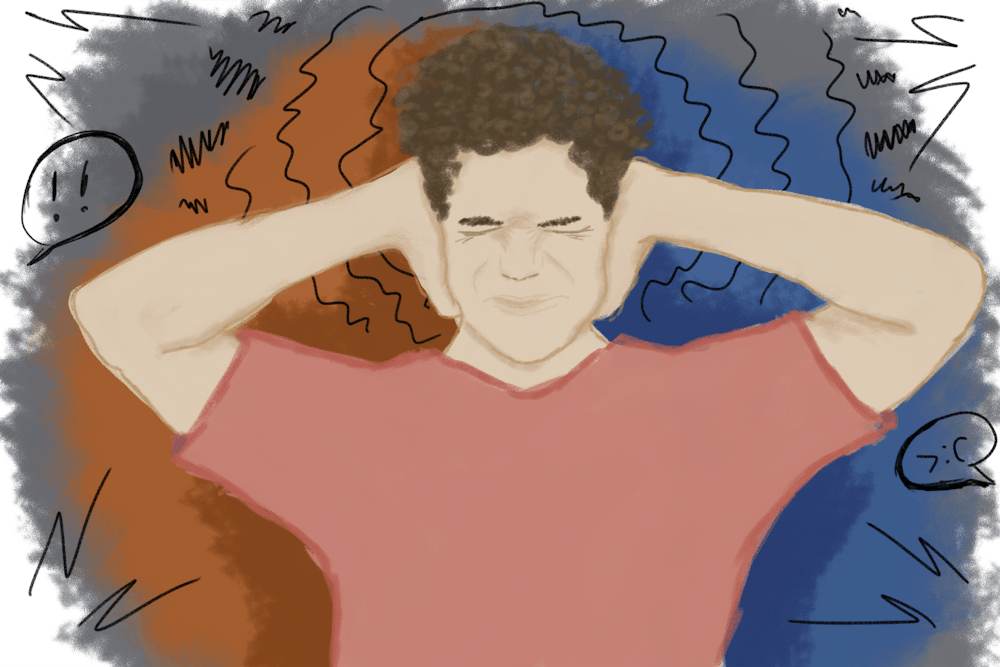Picture this: You’re scrolling through your phone when a breaking political story appears — maybe a tragic mass shooting, a controversial court ruling or another upsetting headline. Instantly, your pulse quickens, and your chest tightens — frustration and anger surge. Before you know it, you’ve fired off a heated comment on social media or started arguing with the first person who will listen.
Psychologists actually have a name for this kind of momentary emotional takeover. Daniel Goleman, an American psychologist, described it as an “amygdala hijack” or emotional hijacking — essentially, your brain’s fear center hijacks control from your rational-thinking brain.

What’s especially alarming is how politics these days seems to trigger emotional hijacks at every turn. Increasingly, our political discussions — online, on campus and around the dinner table — are losing any semblance of serenity. They’re devolving into shouting matches fueled by gut reactions rather than thoughtful exchanges.
There’s a fine line between using emotion in an argument and letting emotion drive the argument. Lately, that line is being obliterated. The emotionality has seeped out of carefully crafted emotion-based political messaging and into emotionally charged interactions, warping how everyday people debate public issues.
Political strategists are not blind to this phenomenon. Emotions are actively weaponized in today’s polarized environment. Parties and experts routinely exploit gut feelings to deepen group loyalty — and to demonize the other side.
When we’re furious or terrified, we’re in no condition to listen or persuade; our reasoning capacity is effectively offline. Yet that’s precisely when many of us are most tempted to sound off on politics — when emotions are hottest.
And people are increasingly anxious about engaging with those who hold opposing views — and for good reason. A 2023 Pew Research Center survey found that, "around six-in-ten U.S. adults (61%) say having political conversations with people they disagree with is generally 'stressful and frustrating,' while about a third (36%) say these types of conversations are generally 'interesting and informative.'"
Many Americans aren’t just stressed by these confrontations; they’re exhausted and scared. In Pew’s research, majorities reported feeling worn out and angry when they think about politics these days.
The constant tension has people on edge. The American Psychological Association’s Stress in America 2024 poll painted an even grimmer picture; A whopping 77% of adults said the future of our nation is a significant source of stress in their daily lives, and 72% said they worried that the outcome of the election could lead to political violence.
These fears and stressors stem from concerns of the erosion of democracy due to political polarization and restrictions on civil liberties. Ensuring democracy is preserved and fears are subsided will require reducing the emotionality of politics. Alia Braley, a researcher at UC Berkeley who studies political polarization, articulated this well and said, “If you want to stop democratic backsliding, you have to be sensitive to the fear and try to turn down the temperature.”
Easier said than done, of course. When you’re the one in the grip of an emotional hijack, how do you pull back? There are some practical strategies, similar to mental health first aid, for heated moments.
Recognize and name your emotion: Literally pause, and think, “I am feeling furious” or “I am really scared right now.” It sounds simple, but this act of naming engages your frontal lobes — the rational part of the brain — just enough to get a foothold.
Next, hit the pause button. Don’t respond right away. Create some space between whatever provoked you — the tweet you just read or the comment your classmate just made — and your response. This might mean counting to 10, taking a few slow breaths or even saying, “I need a minute to gather my thoughts.”
While you pause, reflect on why you feel so strongly. Ask yourself, "What is it about this issue or comment that set me off?" Often, you’ll find it touches on a core value or a personal experience. Acknowledging that can help you communicate better.
It can also help to vent in a safe outlet before engaging with an adversary. Call a trusted friend, or talk to someone who isn’t involved in the debate, and pour out your unfiltered feelings privately.
Finally, take a wider perspective. In an emotionally charged state, our minds tend to zoom in on the trigger and magnify it to catastrophic proportions. Try to zoom out.
Importantly, if you find yourself already in a spiraling, hijacked debate, it’s never too late to course-correct. You can literally call a timeout: “This conversation is getting very heated. Maybe we should continue it later when we’ve both had a chance to cool off.”
The goal isn’t to “win” the argument in the moment by sheer force of volume; the goal is to actually communicate. You can’t persuade someone who’s feeling attacked, and you certainly won’t be persuaded by them if you feel that way. De-escalation is sometimes the only path forward.
In fact, a major study in 2024 by Braley found that one of the most effective ways to reduce partisan animosity was simply informing people that the other side isn’t as extreme or malicious as they imagine. When the temperature drops, we realize most of us do share fundamental values — we all worry about our families, our country’s future and the principles of democracy.
Important issues — climate change, inequality, public health — will remain unaddressed while we rage at each other. In a worst-case scenario, our democratic norms could erode under the weight of constant anger and mistrust.
If we want political change, we must first change how we debate. Turning down the temperature doesn’t mean toning down our ideals or passion — it means channeling those ideals through reasoned discourse rather than raw fury.

